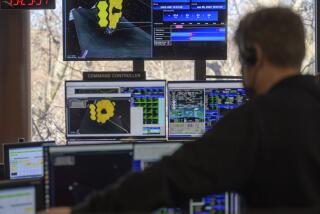Northrop’s Next Step: Defense Buildup?
- Share via
Its merger plans with Lockheed Martin Corp. now history, Northrop Grumman Corp. will probably seek buyout candidates itself to get bigger, analysts said Thursday.
But the Los Angeles-based aerospace concern could also compete effectively without acquisitions, its chief executive said.
The merger was supposed to help Northrop Grumman--currently a mid-size player in the industry, with $9 billion in annual sales--gain the critical mass needed to stay competitive with the three giant companies that have come to dominate the industry through mergers of their own.
They are Lockheed Martin, Boeing Co. (which bought McDonnell Douglas Corp.) and Raytheon Co. (which bought Hughes Electronics Corp.’s defense business, among others).
Given the concerns of U.S. antitrust regulators that ultimately caused Lockheed Martin to drop its bid late Thursday, analysts ruled out the likelihood of Boeing or Raytheon launching their own bids for Northrop Grumman, a leading defense electronics concern that also makes the B-2 stealth bomber and major portions of jet fighters and commercial airliners.
“Certainly, neither Boeing nor Raytheon could buy Northrop,” said Merrill Lynch & Co. analyst Byron Callan. “But you might think more in terms of who Northrop Grumman might buy.”
Indeed, he and others said Northrop Grumman itself could look to buy other small- or mid-size defense companies to bulk up its size, and therefore garner more business at a time when shrinking military budgets are making it hard for all defense companies to keep growing, analysts said.
“Northrop Grumman needs to . . . look for acquisition candidates,” said John Modzelewski, an analyast at PaineWebber Inc.
Kent Kresa, Northrop Grumman’s chief executive, wouldn’t rule out strategic acquisitions, but also said “we can compete effectively at the size we are. We’re No. 1 or No. 2 in virtually all of the areas that we compete in.”
It’s been a forgettable week for Kresa and Northrop Grumman. On Wednesday, the company posted a 14% decline in second-quarter earnings, and warned that its full-year revenue and earnings would be weaker than expected.
Then early Thursday, talks between Northrop Grumman, Lockheed and the government broke down, which sent Northrop Grumman’s stock plunging $5.69 a share to close at $97.38 in New York Stock Exchange composite trading. Lockheed Martin’s stock slipped 56 cents a share, to $103.94, on the Big Board. And after the market closed, Lockheed canceled the merger.
Although its stock fell, Northrop Grumman could benefit from having the merger scrapped, observers said. The company is no longer distracted by its legal fight with the government and is now free to pursue other deals.
“They had to get out from under this thing, because they were never going to win,” Modzelewski said.
But finding other merger partners won’t be easy. With weapons makers undergoing a merger frenzy in recent years, there aren’t a lot of companies left for Northrop Grumman to consider.
Among the potential candidates--which have been mentioned many times as buyout targets--are Woodland Hills-based Litton Industries Inc., another defense-electronics concern; the Redondo Beach-based space division of TRW Inc.; submarine maker General Dynamics Corp.; munitions maker Alliant Techsystems Inc. and rocket maker Cordant Technologies Inc.
Northrop Grumman is “certainly a large, important, viable company,” said Robert Paulson, chief executive of Aerostar Capital Investment Co. in Wilson, Wyo. “But the economics of it [the defense field] suggests that Northrop needs to be on one of the giant teams.”
*
Times staff writers Karen Kaplan and Elizabeth Douglass contributed to this report.
*
* MAIN STORY: A1
More to Read
Inside the business of entertainment
The Wide Shot brings you news, analysis and insights on everything from streaming wars to production — and what it all means for the future.
You may occasionally receive promotional content from the Los Angeles Times.











